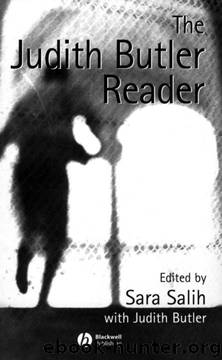The Judith Butler Reader by Sara Salih & Judith Butler

Author:Sara Salih & Judith Butler [Salih, Sara & Butler, Judith]
Language: eng
Format: epub
Tags: Gay & Lesbian, History, Nonfiction, Philosophy, Politics & Social Sciences, Modern, Social Sciences, Communication & Media Studies, Gender Studies, Specific Demographics, Women's Studies, Feminist Theory, Media Studies, Special Groups
Amazon: B000V5A5YU
Publisher: Wiley-Blackwell
Published: 2004-02-02T05:00:00+00:00
Introduction
What is the relationship between fantasy, reality and the law? Are pornographic representations harmful in any "real" sense towards those they depict, and if so, should such representations be prohibited and censored? Butler enters the pornography/censorship debate with her article "The Force of Fantasy" which was published in differences: A Journal Of Feminist Cultural Studies the year after the notorious legal amendment presented by Jesse Helms, the right-wing Republican Senator from North Carolina. In his amendment, Helms sought to prevent the National Endowment for the Arts from funding artistic projects deemed to be "obscene," and he attacked the photographer Robert Mapplethorpe's work in particular for what Helms claimed were pornographic and obscene sexual depictions. Rather than debating whether or not Mapplethorpe's work is "obscene," Butler cleverly focuses on Helms's own discourse which she asserts is itself a sadomasochistic, necrophiliac fantasy, exactly the kind of pornographic exercise it seeks to prohibit. Indeed, throughout this article Butler argues that in their calls for censorship, would-be censors such as Helms effectively recirculate the very discourses they aim to renounce, an argument that is also deployed in Excitable Speech. While Helms's legal clauses may be regarded as the homosexual fantasies of a "straight" senator, Butler similarly asserts that the pro-censorship, anti-pornography campaigner Andrea Dworkin makes use of "pornographic" discursive structures in her aggressive and insistent attacks on "obscene" representations.
By blurring the distinction between pornographic representations and the law which produces and recycles such representations, Butler problematizes the distinction between fantasy and the "real." The argument that the real is a phantasmatic construction will be familiar from Bodies That Matter where Butler describes the body as a linguistically constituted psychic projection. Similarly, in "The Force of Fantasy," Butler understands the real as "a variable construction which is always and only determined in relation to its constitutive outside"; in other words, fantasy is essential to a real which itself turns out to be a construction established on the basis of its differentiation from fantasy. Crucially, fantasy is no more than "suspended action," and here, as in Excitable Speech, Butler assumes that even if representations like Mapplethorpe's offend, they should not be subject to censorship (although she finds herself in paradoxical alliance with Dworkin in her doubtful attitude towards Mapplethorpe's depiction of naked black men). Representations do not inevitably have the power to injure their viewers in any "real" or metaphorical sense for the following reasons: (i) "obscene" representations are not effective performatives which have the power to enact what they name; (ii) these fantastic, allegorical texts do not have a single meaning; and (iii) they are not bound to a single interpretation. Dworkin's epistemologically overdetermined readings and others like them regard pornographic texts as actually violent, casting the woman as victim and implying that there is only one way of reading. On the other hand, Butler insists that fantasies exceed the strict gender binarisms which currently structure heterosexual hegemony, so that what she calls "the possibility of a cross-identification" will lead to the kind of radical re-citation she has already described in Gender Trouble and Bodies That Matter.
Download
This site does not store any files on its server. We only index and link to content provided by other sites. Please contact the content providers to delete copyright contents if any and email us, we'll remove relevant links or contents immediately.
| African-American Studies | Asian American Studies |
| Disabled | Ethnic Studies |
| Hispanic American Studies | LGBT |
| Minority Studies | Native American Studies |
Cecilia; Or, Memoirs of an Heiress — Volume 1 by Fanny Burney(32558)
The Great Music City by Andrea Baker(32020)
Cecilia; Or, Memoirs of an Heiress — Volume 2 by Fanny Burney(31956)
Cecilia; Or, Memoirs of an Heiress — Volume 3 by Fanny Burney(31942)
We're Going to Need More Wine by Gabrielle Union(19046)
All the Missing Girls by Megan Miranda(16031)
Pimp by Iceberg Slim(14508)
For the Love of Europe by Rick Steves(14122)
Bombshells: Glamour Girls of a Lifetime by Sullivan Steve(14077)
Talking to Strangers by Malcolm Gladwell(13371)
Norse Mythology by Gaiman Neil(13370)
Fifty Shades Freed by E L James(13243)
Mindhunter: Inside the FBI's Elite Serial Crime Unit by John E. Douglas & Mark Olshaker(9344)
Crazy Rich Asians by Kevin Kwan(9292)
The Lost Art of Listening by Michael P. Nichols(7506)
Enlightenment Now: The Case for Reason, Science, Humanism, and Progress by Steven Pinker(7314)
The Four Agreements by Don Miguel Ruiz(6765)
Bad Blood by John Carreyrou(6622)
Weapons of Math Destruction by Cathy O'Neil(6281)
